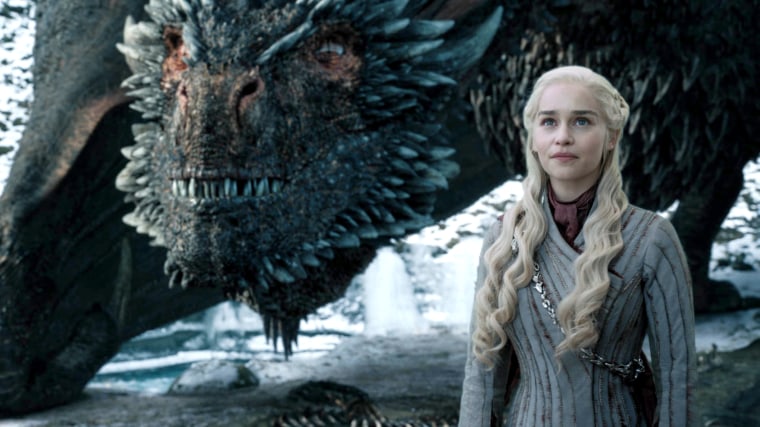From the onset, “A Song of Ice and Fire” was a fantasy series bent of challenging the tropes that have often defined the genre. What if the hero dies? What happens when being on the side of good isn’t enough? Over in the world of “Harry Potter,” Professor Dumbledore challenged his charges to pick between what was right and what was easy. In Westeros, author George R.R. Martin countered that given the choice, most people would pick what was easy every time.
With this kind of track record, it should surprise no one the final season of “Game of Thrones” is pushing these themes even further, asking, “What happens after good conquers evil?” The answer isn’t a happy ending.
Last week’s Battle of Winterfell was controversial among the fandom because it concluded too tidily. The Army of the Dead did not prove insurmountable, as one might expect for a mid-season episode, but were defeated with a triumphant bang. The Night King, the stand in for everything that was inarguably evil, was vanquished. The side of the living, the heroes, conquered. (In fact, a surprising number of them survived.) But with three feature-length episodes to go, this seemed a little premature.
In this latest episode, “The Last of the Starks,” “Game of Thrones” reminded fans that Winterfell is not a place where everyone gets everything they want. Gendry, for instance, finds himself awarded a lordship. Not just any title either, but the Lord of Storm’s End, one of the “Seven Kingdoms of Westeros.” It is the standard fantasy ending trope of the heroic bastard recognized, inheriting the seat of power he would have been born to had his parents been married. Thrilled to have jumped the class divide, he runs to Arya, his highborn Stark lover he never thought it possible to court and asks for her hand in marriage. But instead of the expected engagement, she summarily rejects him.
SIGN UP FOR THE THINK WEEKLY NEWSLETTER HERE
Meanwhile, elsewhere in the castle, Jaime Lannister falls into bed with Brienne of Tarth after knighting, fighting and celebrating together. It’s a moment that many fans have waited years for. But will this fan-fiction romance work in real life? Jaime’s face as he lies awake suggests he’s having second thoughts, and by the end of the episode, has left her to return to his sister’s side.
The real mistake is believing that defeating the biggest source of evil will make the eradication of lesser evil elsewhere simple.
However, the real mistake is believing that defeating the biggest source of evil will make the eradication of lesser evil elsewhere simple. This is the same error we’ve seen characters make before. Jon Snow, for example, after surviving Hardhome and his first showdown with the Night King, assumed handling those in the Night’s Watch protesting his anti-White Walker policy would be easy. Instead, he found himself betrayed and stabbed.
High on the removal of the Night King from the world, Daenerys Targaryen thinks storming King’s Landing and kicking Cersei out of her Iron Throne will be a cakewalk. Instead, she walks right into the same hubris trap, and an ambush that takes out not only her closest advisor Missandei, in a beheading scene that echoed the horror of Ned’s death in season one, but the second of her three dragons, Rhaegal.
It is hard to overstate the level of calamity this represents, not just for her cause, but for the series in general. “Game of Thrones” is a show about many things, from politics to climate change, to the evils of the patriarchy. But in the end, for most viewers, “Game of Thrones” is a show about dragons and magic. The show ended it’s first season with the birth of Daenerys’ dragons, and while it hasn’t always emphasized it, their return brings magic back into the world, and into the show. It was a shocking loss last season when the Night King took out Viserion, but reviving him as an ice dragon at least meant the show still had three dragons in some format. Now, in the space of two episodes, it is down to one.
These deaths are in keeping, however, with the show’s belief that the magic of this world helps those who help themselves. Having dragons isn’t an automatic deus ex machina, it’s just a tool to be wielded, either wisely and well or arrogantly and foolishly. This is the second time Daenerys has flown into danger without thinking, proving it isn’t only members of the Stark family who have trouble learning their lessons the first time.
Speaking of the Stark family, while Daenerys is once again learning the value of not assuming her lineage makes her infallible, the ground is shifting under her feet. Last Sunday's victories were great, but this is a country that’s never automatically accepted her divine right to rule as she supposed they would. Jon Snow will continue to insist he has no interest in the Iron Throne, but he’s still a valuable piece to be played against her by those ready to turn back to the political machinations already in process. So what happens after good vanquishes evil? The world keeps turning, and happily ever after isn’t necessarily in the cards.


